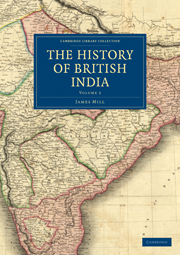Book contents
- Frontmatter
- Contents
- BOOK VI FROM THE ESTABLISHMENT OF THE NEW CONSTITUTION FOR THE GOVERNMENT OF INDIA, A° 1784, TO THE TERMINATION OF THE WAR WITH THE MAHRATTAS, A° 1805
- CHAPTER I
- CHAPTER II
- CHAPTER III
- CHAPTER IV
- CHAPTER V
- CHAPTER VI
- CHAPTER VII
- CHAPTER VIII
- CHAPTER IX
- CHAPTER X
- CHAPTER XI
- CHAPTER XII
- CHAPTER XIII
- INDEX
- Frontmatter
- Contents
- BOOK VI FROM THE ESTABLISHMENT OF THE NEW CONSTITUTION FOR THE GOVERNMENT OF INDIA, A° 1784, TO THE TERMINATION OF THE WAR WITH THE MAHRATTAS, A° 1805
- CHAPTER I
- CHAPTER II
- CHAPTER III
- CHAPTER IV
- CHAPTER V
- CHAPTER VI
- CHAPTER VII
- CHAPTER VIII
- CHAPTER IX
- CHAPTER X
- CHAPTER XI
- CHAPTER XII
- CHAPTER XIII
- INDEX
Summary
The trial of Mr. Hastings commenced in Westminster Hall on the 13th day of February, 1788. So great was the interest which this extraordinary event had excited, that persons of the highest elevation crowded to the scene. After two days were spent in the preliminary and accustomed ceremonies, on the 15th Mr. Burke began. His oration was continued on the 16th, 18th, and 19th, and lasted four days. It was the object of this address to convey to the members of the court a general idea of the character and circumstances of the people of Hindustan; of their situation under the government of Englishmen; of the miseries which he represented them as enduring through the agency of Mr. Hastings; and of the motives, namely, pecuniary corruption, to which he ascribed the offences with which that Governor was charged. The most remarkable passage in the speech was that which related to the enormities imputed to Devi, or Deby Sing; a native placed by Mr. Hastings, in a situation of confidence and power. It cannot be omitted; both because the delivery of it is matter of history, whatever may be the proper judgment with respect to the accusations which it brought; and also, because it gave birth to several subsequent proceedings on the trial. This man was admitted; according to the accuser, improperly, and for corrupt ends; to farm the revenues of a large district of country.
- Type
- Chapter
- Information
- The History of British India , pp. 55 - 170Publisher: Cambridge University PressPrint publication year: 2010First published in: 1817



